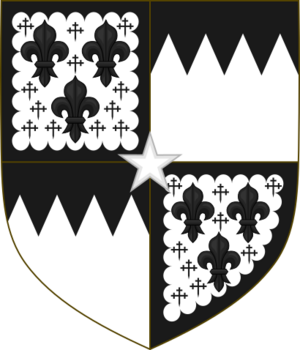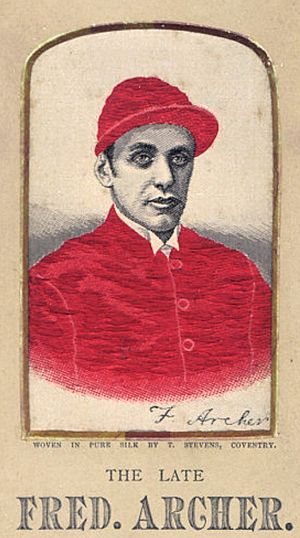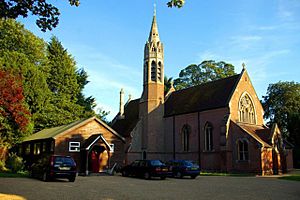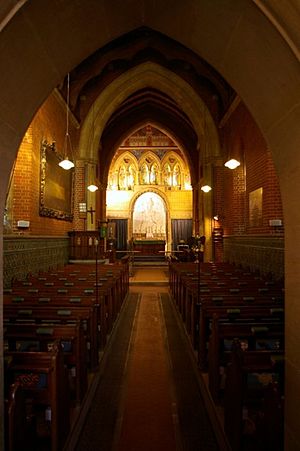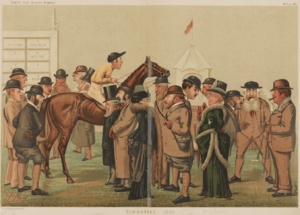Caroline Agnes Graham, Duchess of Montrose facts for kids
Caroline Agnes Graham, Duchess of Montrose (1818–1894), was a famous owner of racehorses and a well-known person in society. People called her the "Red Duchess" because she often wore scarlet clothes at horse races. This color was also her racing team's official color, which she got from her second husband. She was known for betting a lot on races and almost never missed a race where her horses were competing.
Contents
Early Life and Family
Caroline Agnes was born Caroline Agnes Horsley Beresford. Her father was John Beresford, 2nd Baron Decies, and her mother was Charlotte Philadelphia Horsley. Her family, the Beresfords, were known for being a bit unusual and very lively.
Marriages and Family Life
Caroline Agnes was married three times:
- First, in 1836, when she was 18, she married James Graham, 4th Duke of Montrose. He was a Scottish nobleman. They had one son, Douglas Beresford Graham, 5th Duke of Montrose (1852–1925). Both she and her first husband were involved in a train accident in 1860 but survived.
- Second, in 1876, at age 58, she married William Stuart Stirling-Crawfurd. He was a rich Scottish aristocrat and a very important racehorse owner. He was a member of the Jockey Club, which sets the rules for British horse racing. He also helped create the famous Manton training stables in Wiltshire. This marriage was very happy because they both loved horse racing and were similar in age. She continued to be known as the "Duchess of Montrose" for the rest of her life. They did not have any children. After he passed away in 1883, she decided to focus on winning races and building a beautiful memorial for him.
- Third, in 1888, at age 70, she married Marcus Henry Milner. He was 24 years old, a racehorse trainer, soldier, and cricketer. He was 46 years younger than her. The big age difference surprised many people. She gave him a good income. They briefly separated in 1893 but got back together. Marcus Milner later had a successful career in the military.
Her Racing Career
After her second husband, Stirling-Crawfurd, passed away, the Duchess took over his racehorses. She moved them to Bellevue Lodge in Newmarket, which she renamed "Sefton Lodge" after one of his famous Derby-winning horses, "Sefton".
Because women were not allowed to officially own racehorses under the rules of the Jockey Club at that time, the Duchess used a secret name: "Mr Manton." She managed her horses personally for a while. Later, she hired different managers, but she often took back control herself. She was known for her strong opinions about jockeys. She would reward them well if they won, but she was also very direct if she thought they rode poorly. Many jockeys rode for her, but she often had disagreements with them. In 1793, she sold her racing stables at Sefton House.
Building St Agnes's Church
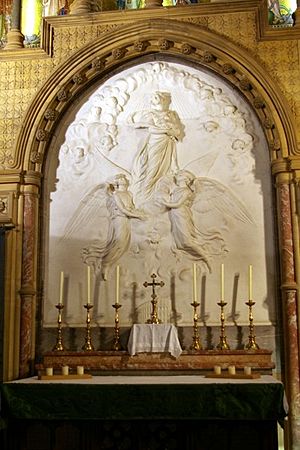
After her second husband, Stirling-Crawfurd, died in 1883, she had him re-buried near their home, Sefton Lodge, in Newmarket. In 1886, to honor his memory, the Duchess had a church built right next to his burial place. She named it St Agnes's Church, after her own middle name.
The church was designed in a beautiful old style, using red brick and limestone, with detailed tiles and mosaics inside. It is considered a very special example of a Victorian-era church. The inside is known for being very rich and colorful, with marble artwork and stained-glass windows. It became a popular church for people involved in horse racing in Newmarket.
As the person who paid for the church, the Duchess had the power to choose the vicar (the church leader). There's a famous story about her and the vicar. One Sunday, the vicar prayed for good weather so farmers could gather their crops. The Duchess was upset because she had a horse racing that day that needed soft ground to win. She told the vicar that if he prayed for fine weather again, she would fire him! Even though her horse didn't win, the vicar kept his job and stayed for many years.
Her Personality
The Duchess of Montrose was known for being very direct and outspoken. She was a familiar face at every racecourse. Everyone, from important people like the Prince of Wales to the young jockeys, knew her. The Prince of Wales would congratulate her when her horses won.
She had a unique style of dressing, often in very bold colors, and was sometimes described as having a "masculine and horsey" look. She was popular in the racing world, but she also had a sharp wit. For example, she disliked handicappers (people who set weights for horses in races) and once called one "the man who murdered his mother." She also had a trainer named Mr. Peace, whom she humorously called "the Peace that passeth all understanding," playing on a famous phrase. She was known for her sense of fun and good nature, making her a favorite at country houses.
Death
The Duchess of Montrose passed away in 1894 at her home in London. She was buried next to her second husband, Stirling-Crawfurd, in the churchyard of St Agnes's Church in Newmarket, the church she had built for him. After her death, her belongings, including books, pictures, jewelry, and furniture, were sold at auction.
 | Claudette Colvin |
 | Myrlie Evers-Williams |
 | Alberta Odell Jones |


